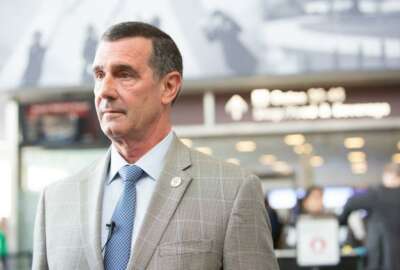This Homeland Security cooperative agreement spans an ocean and a sea
The Homeland Security Department's Science and Technology Directorate has teamed up with counterparts in Israel. The goal of the program, now in its seventh year,...
Best listening experience is on Chrome, Firefox or Safari. Subscribe to Federal Drive’s daily audio interviews on Apple Podcasts or PodcastOne.
The Homeland Security Department’s Science and Technology Directorate has teamed up with counterparts in Israel. The goal of the program, now in its seventh year, is to fund the discovery of what it calls advanced solutions for mission-critical homeland security needs. For how it all works, the Federal Drive with Tom Temin spoke to the director of industry partnerships in the Office of Innovation and Collaboration, Megan Mahle.
Interview transcript:
Tom Temin: Ms. Mahle, good to have you on
Megan Mahle: Good to be here.
Tom Temin: All right, tell us about this program, what it is you’re trying to develop? First of all, what do you hope for each year as the outcomes of this program?
Megan Mahle: Sure. So our joint relationship with the Israel Ministry of Public Security is to jointly develop commercial solutions that will have an impact both in Israel and the U.S. So we have certain priority areas, the Israeli government has certain priority areas, and we know there’s a lot of overlap. And we know there’s a lot of innovation happening in both countries.
Tom Temin: Yeah, I imagine Russia is part of the overlap in these current times. But when you say advanced technologies, in other words, this is a grant program for people that apply and develop things that you were seeking?
Megan Mahle: Correct. So the BIRD Foundation, we provide funding to the BIRD Foundation, which was jointly initiated by the U.S. and Israeli governments. And they award grants to partnerships between a U.S. entity and an Israeli entity.
Tom Temin: And BIRD, of course, stands for Bi-national Industrial Research and Development Foundation. And what are the priority areas this year? Can you go into some detail on those?
Megan Mahle: So we on the DHS Science and Technology side, we make sure that our priorities map to our end user capability gaps. So the things we’re seeing from DHS components, and then we talk about those with our Israeli counterparts to see what they’re focused on. And so this year, the call for proposals that’s open right now focuses on advanced first responder technologies, combating cybercrime, border protection, safe and secure cities, securing critical infrastructure and unmanned aerial systems.
Tom Temin: Yeah, that pretty much covers the gamut of all of the DHS component missions, and then some, and who is a typical grantee here, these are academic institutions, or can corporations apply? And who can get in on this?
Megan Mahle: We find a lot of small businesses are interested in it. They do partner with academic institutions. I think we’re looking for people who are interested in taking some risks and people who are interested in commercializing technologies as well.
Tom Temin: And these grants, what size are they? Are they million dollar level, $10,000 development? I mean, these programs often have a wide range of sizes that go out.
Megan Mahle: Correct, the grants are up to $1 million per project, which is funding up to 50% of the combined budget that the companies contribute.
Tom Temin: And who comes up with the ideas? In other words, do you tell them we just need some ideas in unmanned systems? Or do you have more specific reach out that you send to them?
Megan Mahle: So that’s a really interesting part here is we keep it very broad, those lists of topics that I rattled off a couple seconds ago. That’s it. That’s the call for proposals. We really want to hear the unique ideas, we don’t want to be too prescriptive about what we’re looking for.
Tom Temin: And how do you get to the right people with notice of this, because it’s kind of what we don’t know, situation?
Megan Mahle: You know, it could be a really niche area, we want to find partnerships in both countries. I want to make sure that as many people are aware of this program as possible. That’s why interviews like this are great, because I want new people who haven’t heard of this before. And if a US. company is hearing this, you don’t have to have an Israeli partner right now. The BIRD Foundation actually does quite a bit of matchmaking. And they will listen to an individual’s capabilities and try to partner with another company that they know of on the other side.
Tom Temin: Right. So two grantees could come up with something that someone in the middle like the BIRD Foundation says, wow, if we combine these, we could really develop something and they play matchmaker?
Megan Mahle: Correct. So they’ll bring the companies together, the entities together, and then they can jointly work on a proposal and, you know, bring their two disparate technologies into one solution.
Tom Temin: We’re speaking with Megan Mahle, she’s director of industry partnerships in the Office of Innovation and Collaboration at the DHS Science and Technology Directorate. And give us an example of some things that have been produced by this program in the past.
Megan Mahle: Sure. So we have a technology that was developed by Blue White Robotics in Israel and Easy Aerial in the U.S., two different companies. They developed a control and command center for drones, for multi-use drones. So basically, you can enable simultaneous operation of multiple drones, and then you can perform different types of missions with one aerial view. And testing has been used in Israel to locate trapped people and assess damage to buildings as an example.
Tom Temin: And the output of the grantees is what? An idea, a blueprint, a plan or is it sometimes a product or a prototype?
Megan Mahle: We’re really focusing on commercial solutions. So we really want to see an actual technology that could be brought to market in both the U.S. and Israel. So a lot of the grants will include testing by a U.S. partner on the government or an Israeli partner within their government to really see how this would be used by end users. And then the companies focus a great deal on getting their commercial solution out in both or either countries.
Tom Temin: So could they have a solution already in commercial use, say it’s something to deliver pizzas? It turns out this drone technology could do something else that’s important to national security. And it would be almost a technology reuse, as opposed to something new, would that qualify?
Megan Mahle: Absolutely, absolutely. We’re not looking for basic research ideas, we’re looking for things that can be tweaked, given a little bit of attention, and a new use case, really come up with a great new solution.
Tom Temin: And what if new patents come out of this? Are they able to patent the thing? And how does the intellectual property get handled? If say, FEMA decides they’d like to buy 10,000 of it, at some point?
Megan Mahle: The companies retain all of the intellectual property, the foundation doesn’t take any. We don’t either. There’s usually limited government use rights that are associated with it. But the companies are responsible for any of the intellectual property.
Tom Temin: Now you’re Science and Technology Directorate, but this is done on behalf of the many components of DHS, I presume that includes even the Coast Guard, too. So how does the idea get known to the people you think it might apply to? Or do they send in ideas in the first place?
Megan Mahle: We do a lot of engagement with our components to understand where the requirements are and how they line up. And then also, we bring in subject matter experts as part of proposal reviews. So we’re reviewing on the government side, all of the grant ideas that are coming in to really see how they will fit into our operations. So we want those end users involved upfront.
Tom Temin: And I just wanted to ask a detailed question. One of the areas you mentioned is border security. Give us an example of what might have come up in the past because border security takes so many forms, it takes human intervention, it sometimes takes walls, if that’s the bent of the administration. And over the years that have been many, many attempts at making technological walls with surveillance and cameras and sensors and so forth. What is the state of the art there now?
Megan Mahle: So we’ve left that intentionally broad. One example might be a project that was done on video analytics and security for remote sites. So you could see how that might be applied to a border situation. But we like to leave it intentionally broad because border means very different things both in the U.S. and in Israel.
Tom Temin: And could it also say, continuing with the border idea, could it extend beyond simply interdiction or stopping of people? Could it also be solutions for handling people that might be in the centers that DHS operates? For people that are refugees or people that are illegal crossers? Or whatever the case might be. Sometimes they’re housed for a while. And could it be technologies to help in that part of the mission?
Megan Mahle: We haven’t seen any specific projects proposed or worked on in that area to date. But again, there’s nothing in the call that speaks one way or the other on that.
Tom Temin: And to the first responder, again, just a detail because it comes to mind. I imagine 5G and deployment of that might be something that people are looking at now.
Megan Mahle: Sure, yeah, we’re absolutely interested in all advanced technology systems. We’ve done a lot of indoor positioning and locating technologies. A lot of the drone technologies have first responder use cases as well.
Tom Temin: That’s all we need is 5G drones, nobody will be able to hide at all. And just give us the timelines and deadlines for this year’s round.
Megan Mahle: Sure. So our current call for proposals is open until April 25. And that is actually seeking executive summaries. There’ll be a downselect that’s done by the foundation and proposals will be invited to be received by June 27. And then we’ll be making decisions on those by the beginning of September.
Tom Temin: And by the way, who makes the decisions?
Megan Mahle: DHS S&T and Israeli Ministry of Public Security, we jointly prioritize which grants we would like to see move forward, and we actually pitch those to the BIRD board of governors, which is made up of U.S. and Israel government folks.
Tom Temin: Megan Mahle is director of industry partnerships in the Office of Inovation and Collaboration at the DHS Science and Technology Directorate. Thanks so much for joining me.
Megan Mahle: Thank you.
Copyright © 2025 Federal News Network. All rights reserved. This website is not intended for users located within the European Economic Area.
Tom Temin is host of the Federal Drive and has been providing insight on federal technology and management issues for more than 30 years.
Follow @tteminWFED






